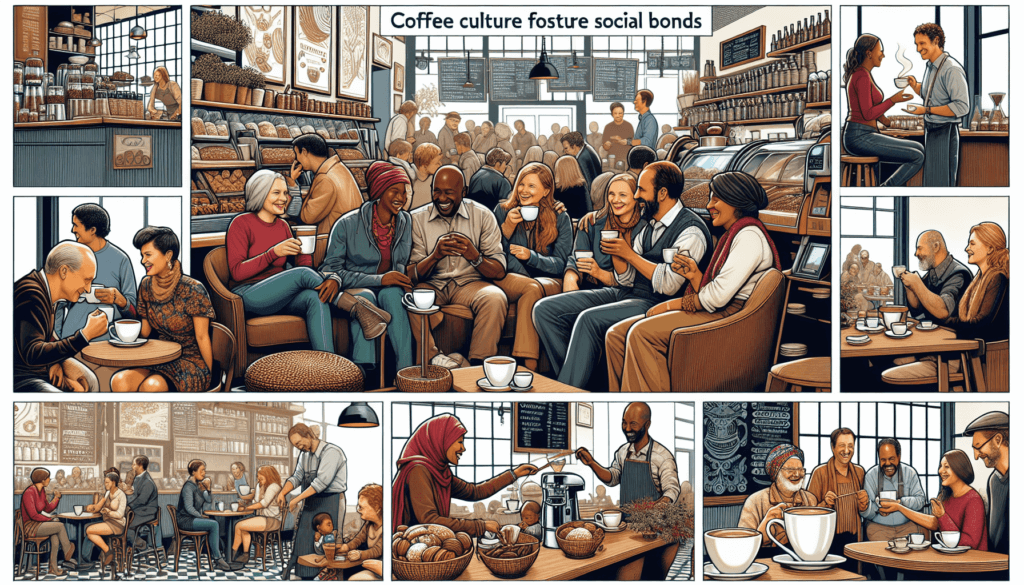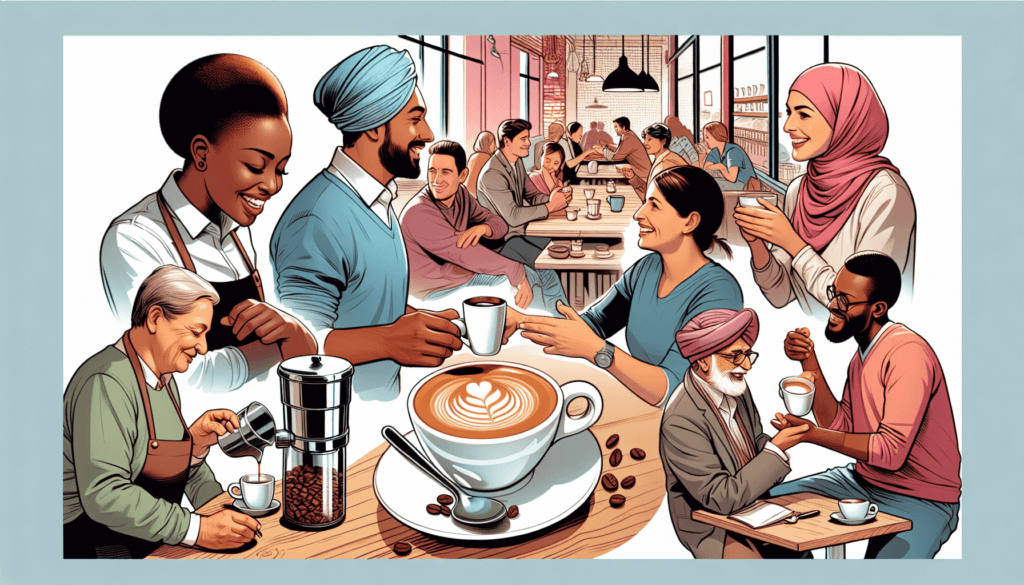Grab a cup of coffee and join us on a journey to explore the fascinating role that this beloved beverage plays in social and community engagement. From coffee shops serving as vibrant gathering places to the art of brewing a perfect cup that sparks conversations, coffee has woven its way into the fabric of society. In this article, we will delve into the reasons behind this caffeine-infused connection and uncover the ways in which coffee brings people together, fosters relationships, and builds stronger communities. So, sit back, relax, and let’s sip our way through the world of coffee and human connection.
History of Coffee
Origins of coffee cultivation
The history of coffee dates back centuries, with its origins traced to the coffee forests of Ethiopia. Legend has it that a goat herder named Kaldi discovered the stimulating effects of coffee when he noticed his goats becoming energetic after eating the berries from a certain plant. This caught the attention of monks in the nearby monastery, who began using the berries to stay awake during long hours of prayer. Thus, the cultivation of coffee began.
Spread of coffee around the world
From Ethiopia, coffee spread throughout the Arabian Peninsula. It became popular among traders and travelers who recognized its invigorating qualities. By the 15th century, coffee had made its way to Yemen, where it became an integral part of social and religious gatherings. It was during this time that coffeehouses, known as “qahveh khaneh,” began to emerge, serving as places for socialization, intellectual discussions, and entertainment.
Coffeehouses and their role in social gatherings
Coffeehouses quickly became centers of social activity, attracting people from all walks of life. These establishments were known as places where individuals could engage in lively conversations, debate ideas, and exchange knowledge. They became important meeting spots for artists, scholars, and revolutionaries, who used coffeehouses as platforms to share their thoughts and discuss societal issues. The emergence of coffeehouses played a significant role in shaping social interactions and the spread of ideas during this period.
Coffee as a Catalyst for Conversation
Breaking the ice
Coffee has long been used as a conversation starter and a way to break the ice in various social settings. Whether it’s meeting someone for the first time or catching up with an old friend, offering a cup of coffee can instantly create a warm and friendly atmosphere. The act of sharing a common beverage provides a natural starting point for conversations, allowing people to connect and get to know each other better.
Creating a relaxed and welcoming environment
The aroma and ambiance of a coffee shop contribute to a relaxed and welcoming environment that encourages open conversation. The cozy seating arrangements, soft lighting, and background chatter create a comfortable space where individuals can feel at ease to engage in discussions. This relaxed atmosphere can extend beyond the coffee shop and into other settings, such as meetings or gatherings at home, where the presence of coffee can help set the tone for a casual and enjoyable experience.
Facilitating networking and socializing
Coffee has become synonymous with networking and socializing in many professional settings. Business meetings, job interviews, and networking events often center around a cup of coffee. The act of sharing a coffee not only provides a neutral setting for networking but also helps to create a sense of camaraderie and rapport among individuals. It is during these coffee-fueled conversations that connections are made, ideas are exchanged, and collaborations are formed.

Coffee’s Role in Community Building
Coffee shops as community hubs
Coffee shops have long served as community gathering places, where people can come together, share stories, and forge connections. They are often considered the heartbeat of a neighborhood, providing a space where residents can meet, socialize, and build relationships. Whether it’s a local coffee shop hosting open mic nights, book clubs, or live music events, these establishments play an essential role in nurturing a sense of community and belonging.
Supporting local businesses and farmers
When you choose to buy coffee from local shops or opt for ethically sourced, fair trade coffee, you are not only supporting local businesses but also contributing to the livelihoods of coffee farmers around the world. By purchasing coffee that has been sourced responsibly, you are ensuring that farmers receive fair compensation for their hard work. This helps foster sustainable and resilient communities, while also promoting environmental stewardship through practices such as organic farming and biodiversity conservation.
Promoting social interactions and connections
Coffee brings people together from all walks of life, promoting social interactions and fostering meaningful connections. Whether it’s catching up with friends over a cup of coffee or engaging in conversations with strangers at a coffee shop, these interactions have the power to bridge gaps, challenge perspectives, and inspire collaboration. Coffee, as a catalyst for human connection, fuels the social fabric of communities and contributes to the overall well-being of individuals.
Coffee and Social Justice
Fair trade coffee
Fair trade coffee ensures that coffee farmers receive a fair price for their produce, allowing them to earn a sustainable income and improve their living conditions. By choosing fair trade coffee, you are supporting efforts to reduce poverty, empower marginalized communities, and promote economic justice. Fair trade certification ensures that farmers are not exploited and that they have access to better healthcare, education, and infrastructure, thereby creating a more equitable and just society.
Ethical sourcing practices
In addition to fair trade, ethical sourcing practices encompass various aspects of social and environmental responsibility. This includes ensuring that coffee is grown using sustainable farming methods, minimizing the use of harmful pesticides, and protecting biodiversity. Ethical sourcing also promotes transparency in the supply chain, ensuring that workers involved in coffee production are treated fairly and provided with safe working conditions. By choosing coffee that adheres to ethical sourcing practices, you are contributing to a more ethical and sustainable coffee industry.
Promoting inclusivity and diversity
Coffee has the power to promote inclusivity and celebrate diversity. Coffee shops can serve as inclusive spaces that embrace people of all backgrounds, fostering an environment where everyone feels welcome and valued. By actively promoting diversity and creating safe spaces for marginalized communities, the coffee industry can contribute to building a society that celebrates the richness of human experiences. Through initiatives such as training programs, mentorship opportunities, and scholarships, coffee can help ensure equal representation and opportunities for everyone.

The Ritual of Coffee
Morning coffee routines
For many, the ritual of brewing and enjoying a cup of coffee in the morning is a cherished part of their daily routine. Whether it’s the comforting aroma, the warm mug in your hands, or the first sip that energizes you for the day ahead, morning coffee rituals offer a moment of solace and reflection. It’s a time to pause, gather your thoughts, and set intentions, providing a sense of stability and comfort amidst the chaos of everyday life.
Coffee breaks and productivity
Coffee breaks are not just about recharging with a caffeine boost; they also play a significant role in productivity and focus. Taking a break from work to enjoy a cup of coffee can provide a mental and physical respite, allowing you to relax, clear your mind, and return to your tasks with renewed energy and focus. The act of stepping away from the desk and engaging in a coffee break can help prevent burnout, enhance creativity, and improve overall job satisfaction.
Shared coffee rituals and traditions
Coffee rituals and traditions vary across cultures, but they all serve as a means of bringing people together and celebrating shared experiences. Whether it’s the Japanese tea ceremony, the Italian espresso culture, or the Ethiopian coffee ceremony, these rituals provide a sense of belonging and cultural identity. The act of preparing and sharing coffee with loved ones or strangers fosters a spirit of connection and unity, transcending language barriers and cultural differences.
Coffee and Cultural Identity
Traditional coffee preparations
Coffee plays a significant role in cultural identity through various traditional preparations and brewing methods. Each culture has its unique way of preparing and drinking coffee, often involving elaborate rituals and specific tools. For example, the Turkish coffee brewing process involves finely ground coffee beans, water, and a cezve, a small pot. By serving coffee in traditional ways, communities preserve their cultural heritage and pass down rituals from one generation to another.
Role of coffee in different cultures
Coffee has been embraced by different cultures around the world, each attributing its unique significance to this beloved beverage. In Italy, coffee is a way of life, with the espresso culture deeply ingrained in daily routines. In the Middle East, coffee symbolizes hospitality, with the offering of coffee to guests being a customary gesture of welcome. In Ethiopia, the birthplace of coffee, the coffee ceremony is a symbol of social connection, friendship, and respect.
Coffee as a symbol of hospitality
Offering a cup of coffee to guests has long been synonymous with hospitality in many cultures. It is a gesture that signifies warmth, generosity, and a desire to connect with others. Whether it’s inviting someone into your home or welcoming visitors to a coffee shop, the act of offering coffee creates an inviting and inclusive environment. Coffee, with its rich history and cultural significance, has an innate power to bring people together and foster a sense of belonging.

Coffee and Social Media
Coffee photography and online sharing
The popularity of coffee has spilled over into the realm of social media, where coffee photography has become a common sight on platforms such as Instagram. From latte art to beautifully arranged coffee spreads, coffee enthusiasts share their love for this beverage by capturing visually appealing images. Coffee photography serves as a form of self-expression and enables individuals to connect with like-minded enthusiasts, sparking conversations and creating virtual communities centered around their shared passion.
Coffee-related hashtags and trends
Coffee-related hashtags on social media platforms enable users to find and engage with content centered around specific topics or trends. From #coffeelovers to #coffeeholic, these hashtags create a sense of community and facilitate conversations among coffee enthusiasts. They serve as a platform for individuals to share their experiences, seek recommendations, and participate in online discussions about coffee-related topics. By using coffee-related hashtags, individuals can discover new perspectives, recipes, and ideas, further establishing coffee as a catalyst for social engagement.
Coffee influencers and communities
Social media has given rise to a new breed of influencers – the coffee influencers. These individuals, with their expertise, passion, and captivating content, have gained significant followings and influence within the coffee community. Coffee influencers not only share their coffee-related experiences but also educate and inspire their audiences through tutorials, reviews, and engaging conversations. Their online presence creates opportunities for genuine connection and collaboration within the coffee community, while also serving as a platform for spreading awareness about coffee-related issues and causes.
The Rise of Coffee Events
Coffee festivals and competitions
Coffee festivals have gained popularity worldwide, showcasing the diversity and creativity within the coffee industry. These events bring together coffee enthusiasts, industry professionals, and the general public to celebrate all things coffee. From latte art competitions to brewing demonstrations, coffee festivals provide a platform for learning, exploration, and appreciation of the craft. They create opportunities for networking, discovering new trends, and engaging in conversations with passionate individuals who share a common love for coffee.
Barista workshops and latte art classes
Barista workshops and latte art classes cater to those eager to enhance their coffee skills and delve into the artistry of coffee making. These interactive sessions provide valuable hands-on experience in brewing techniques, coffee tasting, and latte art. Participants have the opportunity to learn from experienced baristas, connect with fellow coffee enthusiasts, and gain insights into the intricacies of the coffee industry. These workshops and classes not only foster personal growth but also contribute to a thriving coffee culture by nurturing skilled and passionate individuals.
Coffee tasting and cupping sessions
Coffee tasting and cupping sessions offer a sensory experience that allows participants to explore the flavors, aromas, and nuances of different coffee varieties. These sessions provide an opportunity to learn about the origin, processing methods, and tasting profiles of various coffees. By engaging in cupping sessions, individuals not only develop their palate but also gain a deeper appreciation for the complexity and diversity found within the world of coffee. These events further foster a sense of community among coffee enthusiasts and professionals by sharing knowledge, sharing experiences, and building connections.

Coffee and Volunteerism
Coffee as a motivation for volunteers
Coffee has become a staple in volunteer settings, providing volunteers with the much-needed energy and motivation to carry out their tasks. Whether it’s serving coffee during community events or providing caffeine for volunteers working long hours, coffee acts as a fuel that keeps individuals energized and focused on their mission. The presence of coffee in volunteer settings creates a sense of comfort, camaraderie, and appreciation for the efforts of those giving their time and energy to make a difference in their communities.
Coffee provided at nonprofit events
Nonprofit organizations often rely on the support of volunteers and donors to carry out their missions. Coffee plays a significant role in creating a welcoming and comforting environment at nonprofit events, contributing to the overall experience of attendees. From fundraising galas to community outreach programs, the provision of coffee not only serves a practical purpose but also symbolizes the organization’s gratitude for the support and participation of its stakeholders. Coffee, in this context, helps foster a sense of community and solidarity among those working towards a common cause.
Coffee shop fundraisers for community causes
Coffee shops have been instrumental in supporting community causes through fundraising initiatives and events. Whether it’s a percentage of sales going towards a specific charity or hosting fundraisers within their premises, coffee shops actively engage in giving back to their communities. These initiatives not only raise funds but also raise awareness about important social issues, providing an opportunity for individuals to contribute to causes they care about. Coffee shops, through their philanthropic endeavors, catalyze community engagement, inspire social change, and demonstrate the power of coffee as a force for good.
The Future of Coffee Engagement
Innovations in coffee technology
As technology continues to evolve, the coffee industry is embracing innovations that enhance the coffee experience. From new brewing methods and advanced espresso machines to smart coffee makers and coffee subscription services, these advancements are revolutionizing how we engage with coffee. With the help of technology, individuals can discover and enjoy a wider range of coffee varieties, personalize their brewing preferences, and engage in discussions and recommendations within online coffee communities.
Virtual coffee gatherings
The rise of virtual communication platforms has given rise to virtual coffee gatherings, providing a way to connect and engage with others from the comfort of your own home. Whether it’s catching up with friends over a video call or participating in virtual coffee tasting sessions, these online gatherings help recreate the social aspect of sharing a cup of coffee. Virtual coffee gatherings have the potential to connect individuals across geographical boundaries, foster global friendships, and promote cross-cultural exchange.
Using coffee as a tool for social change
Coffee has the potential to be a powerful tool for social change by supporting sustainability efforts, promoting economic justice, and advocating for inclusivity. As the coffee industry continues to prioritize ethical sourcing practices, fair trade, and environmental sustainability, it can contribute to a more equitable and sustainable world. By harnessing the collective power of coffee enthusiasts, industry professionals, and consumers, we can drive positive change, raise awareness about social issues, and use coffee as a vehicle to create a more just and inclusive society.
In conclusion, coffee has played a remarkable role in social and community engagement throughout history. From its origins as a stimulating beverage in Ethiopia to the emergence of coffeehouses as centers of intellectual discourse, coffee has acted as a catalyst for conversation and connections. It has built communities, supported local businesses and farmers, and contributed to social justice initiatives. The ritual of coffee, deeply ingrained in our daily lives, fuels our mornings, facilitates productivity, and fosters shared traditions. Coffee’s role in cultural identity and its influence in the age of social media demonstrate its ability to bring people together and spark conversations. Coffee events, volunteerism, and the future of coffee engagement further highlight the multifaceted nature of coffee’s impact on society. As we look to the future, coffee’s potential for creating change is vast, with innovations in technology and virtual gatherings paving the way for continued social and community engagement. So, grab a cup of your favorite brew, savor the flavors, and let coffee be your companion in building connections, embracing diversity, and driving positive change.



